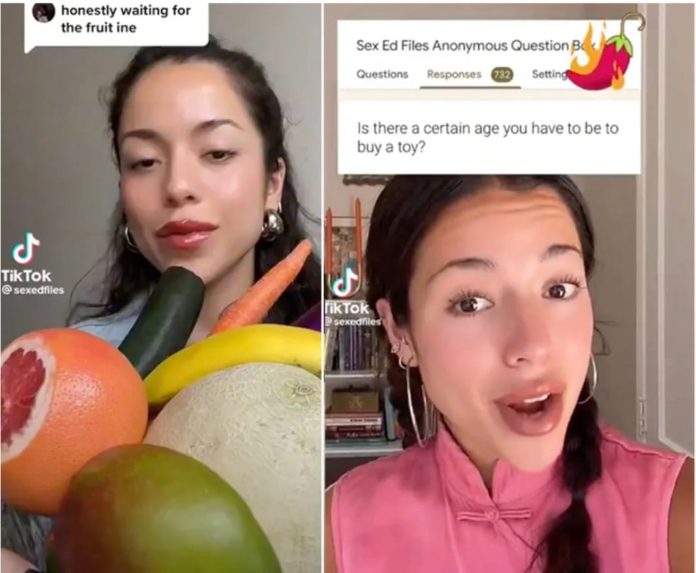Image: Screenshot @sexedfiles/TikTok
A Planned Parenthood educator uses her TikTok, with more than 400k followers and 12 million likes, to show minors how to get sex toys and provides “advice” on how to use “spicy toys” like fruits and vegetables.
While Mariah Caudillo has an 18+ disclaimer on her account, she shares questions she gets from students who are, by her own admission, minors, including one video answering questions from middle schoolers. (warning, graphic content)
@sexedfiles this round up is sooo good. middle schoolers are so funny #healthclass #healtheducator #anonymousquestions ♬ Music Instrument – Gerhard Siagian
@sexedfiles it’s either fear or “omg the s-x lady is here” 👩🏻🏫 🍌 #healthclass #healtheducation #educator #middleschoolers ♬ Speak Now – Taylor Swift
In a LinkedIn bio, which has since been removed, Caudillo was listed as a sex educator for Planned Parenthood Mar Monte, the largest affiliate in the U.S., which provides health and education services to more than 220,000 people annually at over 30 locations in mid-California and northern Nevada.
A Planned Parenthood sex educator, Mariah Caudillo, shared on TikTok how youth can acquire sex toys. In another video she discussed how to use fruits and vegetables as “spicy toys.”
Planned Parenthood, a leading advocate of comprehensive sex education, took home over $600 million in taxpayer dollars from reimbursements and grants, according to its 2021 report. The newer sex ed pushed by the abortion-rights organization is less grounded in purely clinical facts and includes information on sexual orientations and gender identities.
For example, Caudillo believes comprehensive education should be “pleasure-based” and include “skill building.”
“[C]omprehensive sex education curricula is mostly written by white folks who have a tendency to do the bare minimum as it relates to… acknowledging the intersections of racial justice, social justice and reproductive justice,” she said in a post on LinkedIn.
Everyone deserves pleasure in the way they want to experience pleasure. *Reminder: pleasure-based sex education can be tailored to meet the need of the youth you might be working with; in other words, it can be age-appropriate,” she said.
“Is there a certain age you have to be to buy a spicy toy? To my knowledge, there’s not an actual law that prevents young people from purchasing spicy toys. But typically, adult stores have age restrictions, which prevents young folks from purchasing spicy toys in person. You usually have to be 18 and up to shop at these… adult stores,” she said. “However, it’s not illegal to buy spicy toys online, even as a teen, which most people do. You just have to purchase them with a valid credit card, debit card or gift card. So the best thing to do, if you’re curious about spicy toys, or you just want to explore what’s out there or if you want to purchase them, or one, – whatever – is to do so online. Do keep in mind that some of these stores also have age restrictions on their website, but like this app, people can access them anyway.”
On Instagram, in an account that has now been made private, she asks if “the sexuality field too… white?”
A user shared her comments.
View this post on Instagram
She writes. “Like most health professional fields, the answer is YES. It really matters who delivers sex education, and if all sex educators are white we don’t truly accomplish a trauma-informed and intersectional approach to sex education, thus bringing more harm to populations of color and our LGBTQ+ students. Education as a whole, it’s practices and values are influenced by the white majority.”
She continues, “Dr. Sara C. Flowers, an educator, and advocate for inclusive, trauma-informed, sex-positive sexuality education shed light on why Black educcators are so important in an article shared by Clue. ‘Human beings who share cultural, racial, ethnic, religious identities are not a monolith. The unique lens Black educators bring to the work is their ability to integrate their lived experiences as complex humans with intersectional identities. They can use this to inform their teachings—especially when members of their audience share one or more of those identities or experiences.’”
“Having diverse educators is SO important. Representation matters and research shows that teachers who look like their learners help improve knowledge and skill acquisition because those teachers also become role models and mentors.”



